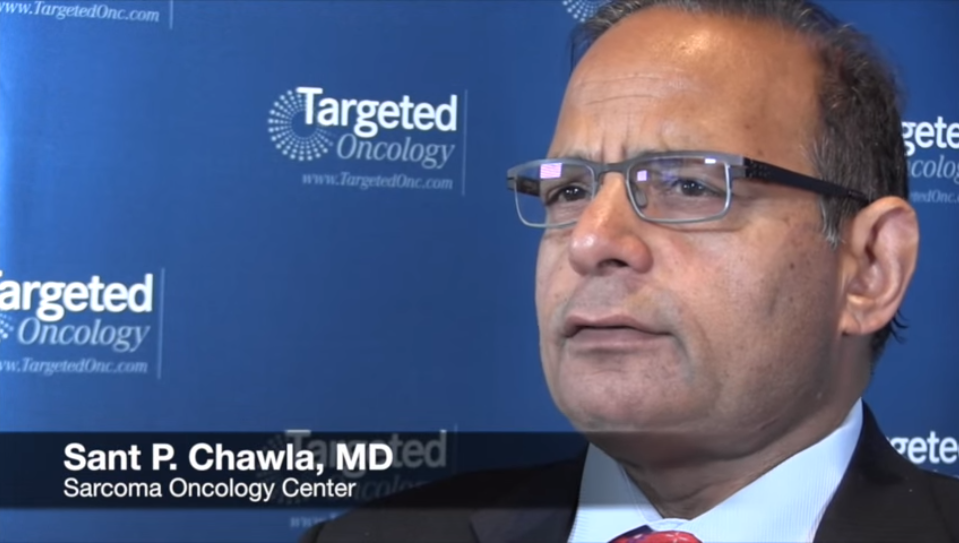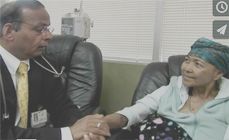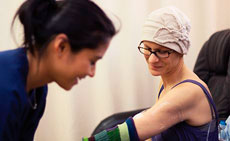Multi-Modal Treatment
Sarcomas are a rare and complex cancer that require a team-oriented treatment approach. As specialists in sarcoma diagnosis and treatment, the Sarcoma Oncology Center is a leading research and clinical trial facility which provides patients with medically advanced cancer care.
Our treatment approach is multi-modal and individualized with each patient receiving care from a prominent team of surgeons, pathologists and radiation oncologists. We collaborate with physicians from medical institutions from St. John’s, Cedars Sinai, M.D. Anderson, UCLA, USC, and Stanford and combined, we implement the most effective multi-modal treatment for each patient.
Our patients receive personal and individualized attention from prestigious oncologists who are specialists in sarcoma and its numerous forms. The oncologists at the Sarcoma Oncology Center are intimately involved in each patient’s care and honor the uniqueness of each person’s needs.
The unique characteristics of a patient’s tumor affect the treatment plan and scope. We consider the grade and stage of the tumor, prior treatments received (if any), progress of the cancer, biopsy analysis and other individual factors. Once all of this is determined, we will have developed the best possible course of treatment. Each case is unique and could include any combination of chemotherapy, radiation and/or surgery.

Chemotherapy
Chemotherapy is the most important treatment available for sarcomas because it is the only form of treatment which prevents and controls the spread of the cancer into the lungs, vital organs and other parts of the body. The Sarcoma Oncology Center leads sarcoma research, and we are considered the pioneers in advanced sarcoma clinical research trials worldwide. The oncologists at the Center can access the most recent cancer drugs and are known for their tremendous efforts in patient care.
 Initially, chemotherapy was highly toxic with significant side effects. In collaboration with internationally renowned oncologists, Dr. Chawla has pioneered new chemotherapy treatments resulting in the reduction or even elimination of side effects. These new treatments protect the heart and kidney, substantially reduce infections and the need for blood transfusions and virtually eliminate nausea and vomiting for most patients. Chemotherapy is an art and science and the right combination of treatments can aggressively eliminate cancer and prevent recurrence while at the same time a patient’s quality of life through treatment is maintained. Over 50% of Dr. Chawla’s patients have worked while being treated with chemotherapy and maintained their daily routine activities and exercise throughout treatment.
Initially, chemotherapy was highly toxic with significant side effects. In collaboration with internationally renowned oncologists, Dr. Chawla has pioneered new chemotherapy treatments resulting in the reduction or even elimination of side effects. These new treatments protect the heart and kidney, substantially reduce infections and the need for blood transfusions and virtually eliminate nausea and vomiting for most patients. Chemotherapy is an art and science and the right combination of treatments can aggressively eliminate cancer and prevent recurrence while at the same time a patient’s quality of life through treatment is maintained. Over 50% of Dr. Chawla’s patients have worked while being treated with chemotherapy and maintained their daily routine activities and exercise throughout treatment.
Radiation
Radiation is another effective tool that is used in specific, localized areas. Radiation therapy can be used before, during and after surgery. It works by sterilizing tumor cells and preventing them from dividing and increasing in number.
Sarcoma, unlike other tumors, can spread along muscles and between them in ways that cannot always be seen or felt. Radiation therapy has proven to be a powerful tool against the spread of the diseased tissue around the tumor. Radiation oncologists typically irradiate tissue five to 10 centimeters (approximately two inches) beyond where the tumor was located.
Surgery
Surgery can be a particularly effective option after initial chemotherapy to shrink sarcoma tumors. With the advent of new adjuvant chemotherapy (post surgical chemotherapy), improved techniques in surgery and the availability of internal prostheses, amputation is now avoided in approximately 95% of sarcoma cases.
Contact the Sarcoma Oncology Experts Today
The Sarcoma Oncology Center’s multi-modal treatment offers patients the best possible solution, Consideration is given to the physical and emotional well-being of each individual patient who comes to us. Please contact our center at 310-552-9999 to schedule a consultation with one of our specialists.
Next, learn more about the Clinical Trials currently ongoing for sarcoma.





